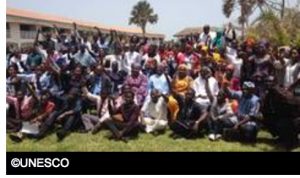FREE FLOW OF INFORMATION
An article from UNESCO
100 young leaders coming from 22 African countries gathered in Banjul, the capital of The Gambia from 9 to 10 May 2017 to develop new strategies for peacebuilding and regional solidarity in Africa. This international conference was an opportunity to celebrate the contribution of youth to the democratic transition in The Gambia and to reflect on the role of youth movements in the transition and consolidation of democracy on the African continent.

Organized under the theme “Youth, Peacebuilding and Regional Solidarity: Lessons from Africa”, the conference provided a platform to reflect on the opportunities and challenges for the development of the continent’s youth and find consensus on how to address them collectively. The forum was organized with the support of the Government of The Gambia, UNESCO, and the African Council for the Development of Social Science Research (CODESRIA).
Participants and various speakers called for more openness and interaction between generations in Africa in order to promote peace and reduce conflicts on the continent. “We need to bridge the generation gap to prevent violence and resolve conflicts in Africa,” said Ibrahim Ceesay, Executive Director of the African Artists Peace Initiative, adding that “it is important in this context to reflect on exclusion, on migratory phenomena linked to the hostile political environment and on the “mutilated promises that impede development”.
Several youth organizations and movements made this event unique by their contribution to the discussions, including the Pan-African Youth Network for the Culture of Peace (PAYNCOP), set up with the support of UNESCO, the Y’en a Marre (Senegal) movement, GambiaHasDecided, the Balai Citoyen du Burkina Faso and the Malawi Students Movement Association. Panafrican leaders also attended the forum, such as Professor Abdoulaye Bathily and the Honorable Halifa Salla, member of the Gambian parliament and outgoing Special Envoy of the UN Secretary General for Central Africa.
(continued in right column)
(Click here for the original French version of this article.)
(continued from left column)
Despite the measures taken to place youth issues at the heart of the development agenda and strengthen their participation in the process of governance, peace and development in the region, the social commitment of young people is still limited by challenges and weaknesses in existing networks and interventions. These challenges and weaknesses include participation without representation, limited allocation of resources for youth development, economic marginality and skill gaps.
The UNESCO Multi-Sectoral Office for the Sahel, under the leadership of Dr Maréma Thiam Touré, Head of Social Sciences, made an effective contribution to the organization of this important international initiative as part of its agenda for youth development and civic education. The Social and Human Sciences Sector of the Dakar Regional Office has set itself the task of providing young people with skills and assisting them, in collaboration with the education and culture sectors, in the promotion of Social innovation and effective participation in the development of their societies, to eradicate poverty and inequality, to consolidate a culture of peace, gender equality and intercultural dialogue. This involves information and communication sciences and technologies, in the realization of the Sustainable Development Objectives.